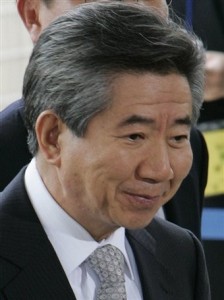 In my most recent book, ONE: The Art and Practice of Conscious Leadership, I wrote about how South Korean activist lawyer and presidential candidate Roh Moo Hyun leveraged technology to become elected – he showed us how technology helps to make us one. This week we received the sad news that Roh had committed suicide.
In my most recent book, ONE: The Art and Practice of Conscious Leadership, I wrote about how South Korean activist lawyer and presidential candidate Roh Moo Hyun leveraged technology to become elected – he showed us how technology helps to make us one. This week we received the sad news that Roh had committed suicide.
In his bid to become President of South Korea Roh leveraged the power of the Internet even before Barak Obama. Self-educated, Roh came from a poor family and in earlier years had been jailed for helping dissidents fight the military regimes of the past. In 1981, Roh defended a student who was arrested on trumped-up charges of anti-state activities, and much of his subsequent work had been as a human rights lawyer defending pro-democracy and labor-rights activists. This endeared him to students and young voters. Admiring his courage, integrity, and reputation as an independent outsider, they formed an Internet fan club to promote his future. In time, this band of supporters grew to 70,000 members and helped launch what has been called the Roh typhoon. The Internet enabled Roh to liberate himself from “black money” – corporate donations that are South Korea’s traditional form of campaign financing. Largely through Internet-based campaign groups, Roh raised the equivalent of about $1 billion from more than 180,000 individual donors in his 2003 presidential bid.
Roh was an underdog, and thus the news of his impending electoral defeat on election day, quickly circulated among young voters via Internet bulletin boards and cell phones powered by digitally savvy student supporters. One Internet site recorded three million hits from around 11:30 p.m. to about 3 a.m. on Election Day – some five to six times the average. Hundreds of thousands of Roh’s young supporters made millions of cell phone calls, and 800,000 text messages flashed to the cell phones of their friends, urging them to go to the polls and vote for Roh.
By 2 p.m., another exit poll showed that Roh was leading his opponent by 2 to 3 percent, and shortly after the polls closed, Roh was declared the winner.
Roh had recently been caught up in a corruption scandal – he admitted that his wife had received $1m from a wealthy businessman, but never admitted any guilt. He said it was a payment to help her settle a debt, and not a bribe. He also said he was aware that the businessman had given another $5m to a relative, but that he thought it was an investment. After Mr Roh’s death was announced, Justice Minister Kim Kyung-han said the corruption case against him would be formally closed.
Roh was a passionate and innovative leader – and he was human. Too often we rush to judgment of leaders, and sometimes our criticism can be so painful and harsh, that it can destabilize a threatened person – and even, as in Roh’s case, drive them to suicide. We hope for a great deal from our leaders, and usually it is given, but too often we forget that they have frailties and self-doubt – just like all of us.
What leaders need from us is support, not judgment and criticism. When things are tough, they need our help to encourage the best that is in them, to restore their self-esteem and belief in themselves, enabling them to be more effective decision-makers and therefore strengthening their capacity to inspire others again.
If you are questioning or undermining your leader ask yourself three questions:
- Is my attitude helping my leader become more effective?
- Am I helping my leader to grow?
- Am I inspiring my leader so much that he or she becomes inspired to inspire me?
The paradox, you see, is that the brilliance of the leader, and their capacity to inspire us, may be reflected in our own brilliance – it is often in our hands just as much as theirs.

Lance,
Thank you for sharing the story of Roh Moo Hyun – it is both inspiring and
and tragic. While it not for us to question the validity of the accusa-
tions against Hyan and his family, it is our place to see the good in
what he stood for, his living example of hope and inspiration.
I appreciate the questions you posed – are we inspiring our leaders to
inspire? Excellent! We are each called to ispire others. When we
consider the call to love unconditionally, it becomes our right AND
responsibility to inspire not just those that welcome our sipirt and light,
but also those that may not; that may only know of the Old Story
Leadership Model – by leading through intimidation vs. inspiration!
Thank you for calling us to inspire our leaders to inspire – beautiful!
With love and light,
Robin
Lance: Thanks for both the inspiring and tragic story of Roh.. and for the reminder to “inspire upwards”.
In my own humanness amidst the distractions of the busy world I forget myself to thank those who have brought me to where I now am.
What great impact provided by such a small token – our thanks is easily multiplied thru the synergism of Inspired Leadership into even greater energy!
I must go do something about that – right now!
David